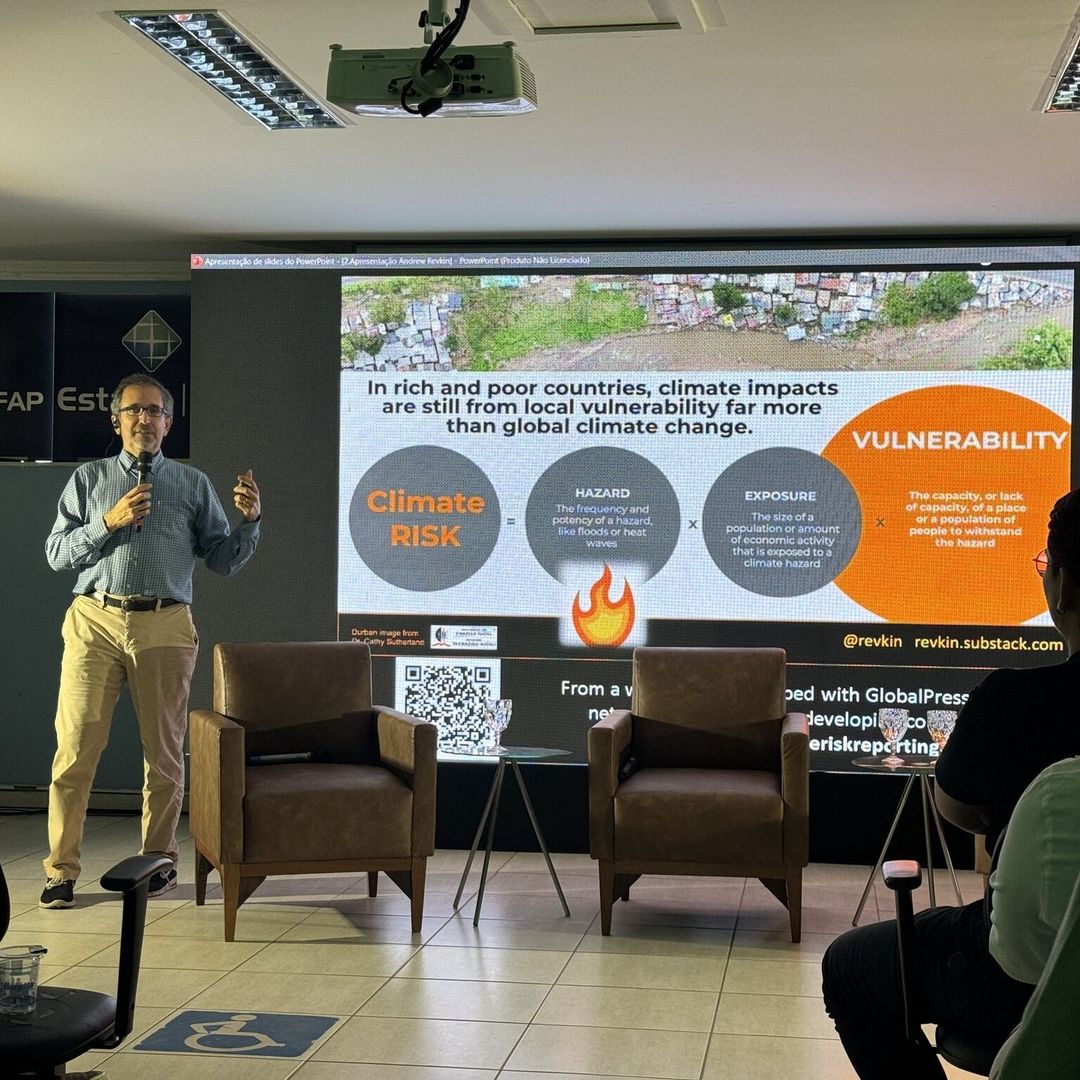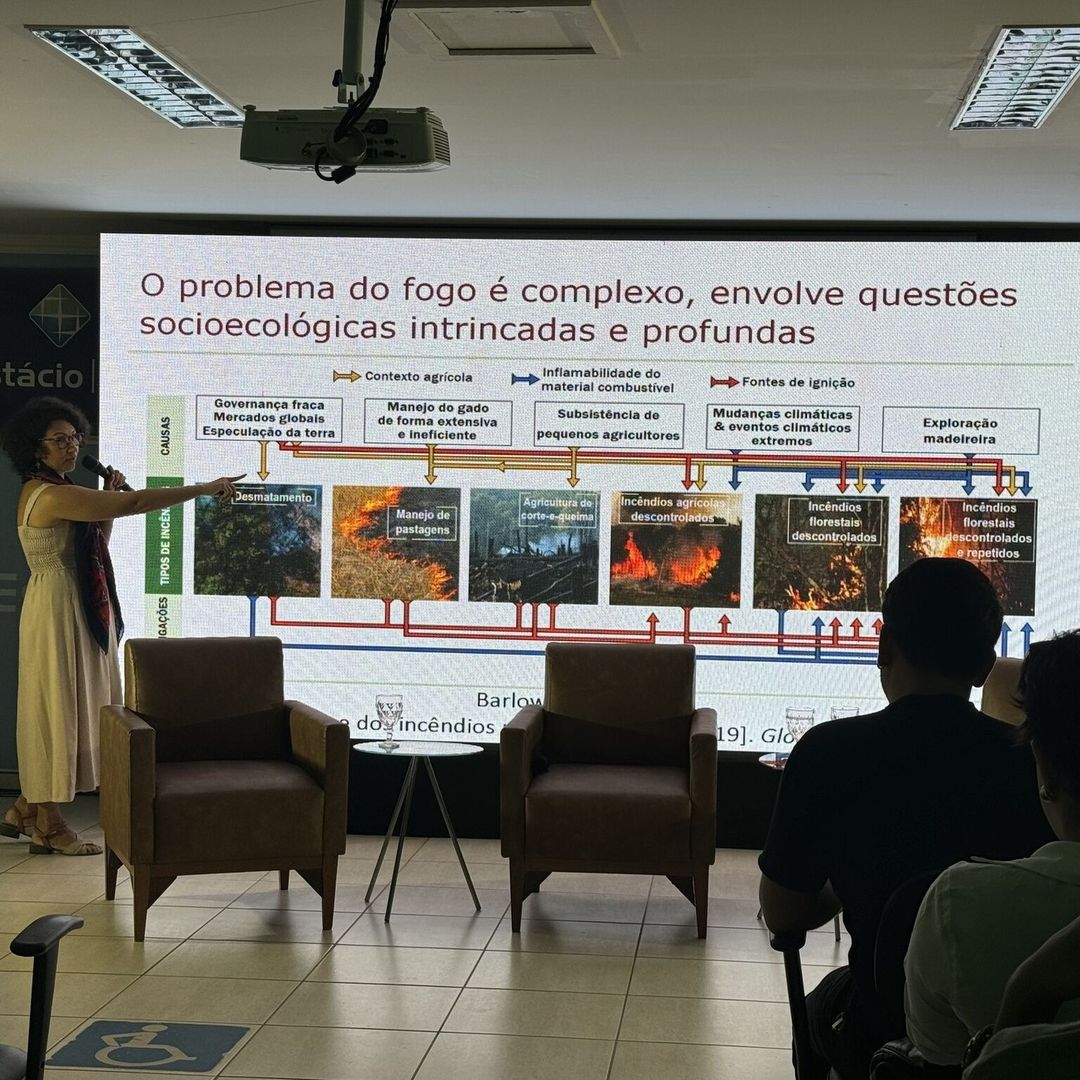By Alice Martins Morais
As COP30 in Belém approaches, which will be held in November 2025, the debate on the climate emergency has intensified. The Amazon is experiencing theworst burning season in 17 years and some municipalities are facing severe droughts of the rivers, while the smoke spreads across the country. In the midst of this reality and the preparations for the largest climate change conference in the world, how can journalistic coverage of the topic be provided, including Science and local voices?
This was the guiding question of the international workshop “Amazon, science and local voices in climate journalism coverage”, held yesterday (27), in Belém. The free event had a hybrid format and brought together communicators, journalists, students and researchers, organized by the Amazônia Vox project, in partnership with the Bem da Amazônia Institute and the United States Embassy in Brazil.
"This is the second training we do and I think we are living in a very important moment to have more qualifications, so that, being here, in Belém, which will host COP30, we can cover what is discussed and decided there May we understand the discussions and ask the necessary questions so as not to get into a ready-made speech", he said at the opening. Daniel Nardin, editor of Amazônia Vox, co-founder of the Bem da Amazônia Institute and member of the Amazonians for Climate Network (RAC).
Intersectionality hasMathematics can open doors
To Andrew Revkin, an American journalist, it is important to note that stories about climate change can be viewed from different angles. They can be about air pollution, but they can also be about behavior and social justice. “What is the story that is new, big and important?” he asked.

Revkin shared experiences from his more than 40 years of experience in environmental and climate coverage, from trips to Manaus (AM) in 1989 to the North Pole in 2003, for example. Among his works, he highlighted the book "The Burning Season", from 1990, which deals with the murder of Chico Mendes and the land conflicts in the region at the time. The work inspired the film of the same name, released in 1994.
"The newsroom is not a place that fits with global warming news, you have to go to the field", highlights Andrew Revkin.
The American was a special reporter for the New York Times and founder and director of the Communication and Sustainability Initiative at the Climate School at Columbia University, in addition to being a member of the Executive Committee of the National Geographic Society and ProPública.
Among his final recommendations, the journalist highlighted the importance of placing people at the center of the narrative, considering what is changing in relation to hazards, the population's exposure to risks and social vulnerability. "Climate risk as a framework for your story can provide many ways to think about how to reduce that danger," he emphasizes.
Deepen knowledge of key terms
In the panel “Local voices and science in the Amazon: sources for climate coverage”, the senior researcher at Embrapa and co-founder of the Sustainable Amazon Network Joice Ferreira taught some basic concepts that journalists must understand to improve their coverage of the topic.
One of the key points, according to her, is to distinguish between fire, burning and arson. "Fire is a survival strategy for traditional indigenous populations. And we need to differentiate the concepts, because we see confusion in the media. Fire is a generic term, while burning is intentional, to clear the land," explains the researcher. "The biggest problem is when the fires get out of control and spread to the forest," she adds.
Another topic she draws attention to is the difference between the consequences of fires in the Cerrado and in the rainforest, as is the case in the Amazon. "Talking only about fire outbreaks in the Amazon is incomplete information, because it depends on where the outbreak is. Whether it is in an area of intentional burning, in the fields, in pasture, or if it has spilled over into the forest," she also warns. Learn more about the types of fire here.
Based on her own experience, Jalília Messias, a reporter for Globo's Network Center in Belém, on TV Liberal, presented the challenges from the perspective of journalism and drew attention to the need to continue seeking more knowledge and deconstruct ideas that have fallen into disuse. "We live in a huge and complex region," she points out. For her, it is essential to always be learning and to report clearly in order to translate issues objectively to the population.

Communication needs to involve the population
Granddaughter of Chico Mendes and biologist, environmental activist and conservation analyst at WWF Brazil, Angelica Mendes, believes that Communication transforms and that it cannot be separated from the climate of social justice. Therefore, it is necessary to have the engagement of several actors in this fight, not only to keep the forest standing, but also to defend the ways of life and culture of the populations of the region.
"The Amazon is not this enchanted forest as it is seen from the outside. There are people who live in this territory and who are taking care of it," says Angélica Mendes.
José Kaeté, an indigenous activist and communicator, contributed to this perception, noting that journalistic work needs to be in line with the times and routines of the communities that will be interviewed. "You need to understand the codes of that community in order to actually be able to approach and talk to them," he points out. In his view, culture can also act as an intermediary in this debate, taking the discussion about climate where journalism and academia do not reach.
International Workshop - For this edition, the international workshop “Amazon, science and local voices in climate journalism coverage” also had institutional support from the International Center for Journalists, through the Knight Fellow program, Lemann Foundation, Digital Journalism Association (Ajor), Estácio College, Amazon Network for Climate (RAC) and REC Producer. This is the second event held by the Bem da Amazônia Institute. The first took place in 2023, within the Amazon Dialogues program. The initiative is part of a series of cycles that will be developed to support climate training and literacy for local communicators and journalists.
Watch the full Workshop here:
Do you want to stay up to date with the latest news from Amazônia Vox and learn about events, courses, calls for applications and scholarships for Amazonians? Sign up for our newsletterhere.




